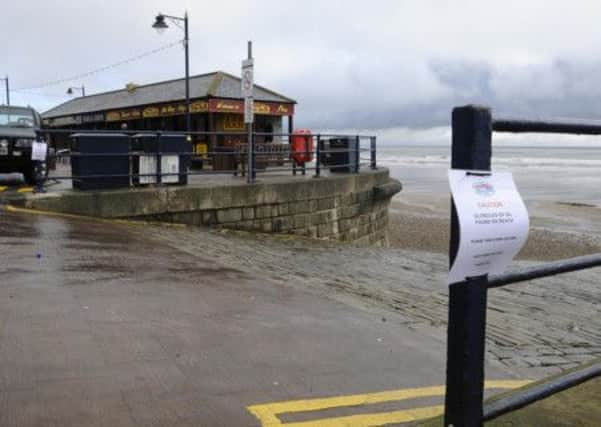Warning signs stay in place at east coast resorts after oil spill


A close watch is being kept along the Yorkshire coastline amid fears more oil pockets could be washed ashore later in the week following the major pollution alert. Chunks of solidified oil – thought to have been leaked from an offshore vessel – began floating ashore on Sunday night after a group of surfers at Cayton Bay, near Filey, raised the alarm.
Environmental health officers confirmed yesterday that a major clean-up operation had been undertaken along a 15-mile stretch of Yorkshire’s coastline between Filey and Scarborough and at least a dozen sea birds had been affected by the oil.
Advertisement
Hide AdAdvertisement
Hide AdWarning signs remain on the shore to inform bathers and surfers, who are out in force because of the strong waves at this time of year, that there is oil on the beach and to avoid contact with the pollution.
Officials at Scarborough Borough Council claimed the pollution is unprecedented given that bathing water quality is normally so assured.
A council spokeswoman said: “I can’t remember having to deal with anything like this before. But that’s why we have emergency planning in place. Tests are being carried out into what it is. But it looks like oil and smells like oil.”
Aerial reconnaissance has been undertaken to see if there was any slick floating out to sea, although the source of the pollution has yet to be established. But one theory is it may have been a leak from a ship or a vessel cleaning its bilge tanks.
Advertisement
Hide AdAdvertisement
Hide AdOfficials confirmed that during rough ocean conditions such discharges can mix with the sea water which increases the viscosity of the oil droplets causing them to thicken and harden.
The Maritime and Coastguard Agency has been trying to pinpoint the source of the pollution, including conducting a surveillance flight, and officials have been liaising with the Environment Agency for samples of the substance to be tested.
The initial clean-up went on until nightfall on Sunday and resumed at dawn on Monday, and emergency planners are braced for more deposits to be washed ashore on the overnight tide.
Scarborough Borough Council’s head of environmental services, Andy Skelton, admitted that while it is thought no more than 15 birds have been affected by the pollution, environmental experts have so far been unable to assess the impact the on the wider marine environment.
Advertisement
Hide AdAdvertisement
Hide AdMr Skelton said: “Our staff have been out inspecting the beaches that were affected and can confirm that no further deposits have been brought onto the beaches. Together with our key partners, we take the view that the worst of the problems are over. However, our staff will continue to monitor our beaches and carry out any cleaning required should further deposits of oil be washed ashore.”
The Maritime and Coastguard Agency confirmed yesterday that no pollution was detected when a surveillance aircraft carried out a search off the Yorkshire coast.
A spokesman added: “Tests are now being carried out on a sample of the product to try to identify exactly what it is and if at all possible, to determine the source.”